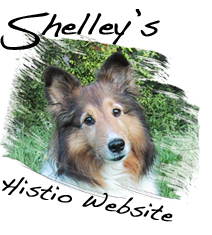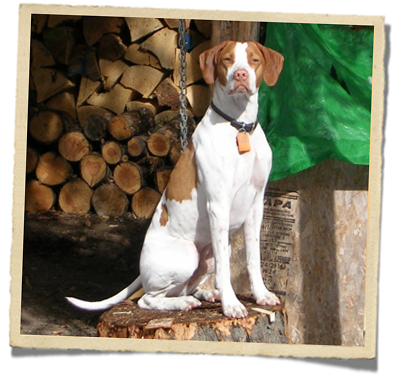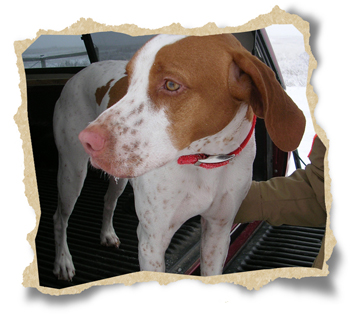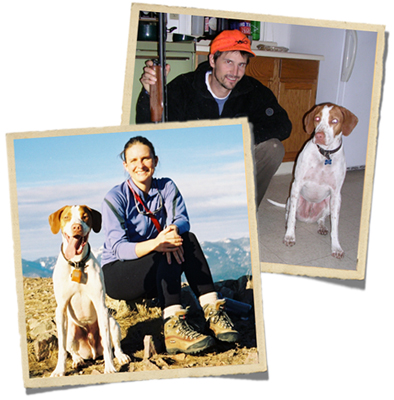
HOME
 YOUR HISTIO STORY
YOUR HISTIO STORY
I am looking for similarities
in all individual cases of
Histiocytic diseases.
I wonder if we all tell our
stories we might come up
with some commonality
between the specific
situations in which all of
our pets got this disease.
So please email me the
details and I'll put your
pets story on Shelley's
Histio Website
 UW HISTIO VERHAAL
UW HISTIO VERHAAL
Ik ben op zoek naar
overeenkomsten in alle
individuele gevallen van
Histiocytose.
Ik hoop dat wanneer wij
onze Histio verhalen
vertellen, wij overeen-
komsten ontdekken over
de manier waarop onze
huisdieren deze ziekte
hebben opgelopen.
Stuur mij de details en
ik zal het verhaal van uw
huisdier op de Histio
website van Shelley zetten.
 WARNING !
WARNING !
These stories are all
different. Individual
symptoms, situations
and circumstances
may vary and response to
therapy is not always the
same.
- Disclaimer -
 WAARSCHUWING !
WAARSCHUWING !
Deze verhalen zijn allemaal
verschillend. Individuele
symptomen, situaties en
omstandigheden kunnen
verschillen en de reactie
op therapie is niet altijd
hetzelfde.
- Disclaimer -
HISTIOCYTOSIS IN
OTHER LANGUAGES
German - Hund
Maligner Histiozytose
French - Chien
l'Histiocytose Maligne
Italian - Canis
Maligni Histiocytosis
Spanish - Perros
Histiocitosis Maligna
Dutch - Hond
Maligne Histiocytose
HOME
Tucker
Malignant Histiocytosis
English Pointer bird dog
Male
August 23, 2002 - November 23, 2007


Tucker was a five year old English Pointer bird dog born 8/23/02 in Dunmor, KY. Todd and I purchased him in Oct. of 2002 and had him shipped out to Montana. He was a very smart puppy and learned things very quickly. We took him everywhere with us and began his bird training in the summer of 2003. His first few hunting seasons were marginal and discouraging due to his long range and lack of control over him. We would open the back of the tailgate and he would bolt out and be out of eyesight in seconds. The electronic collar we had been given to reinforce commands only had a 400 yard range and that would take him seconds to surpass. With a little investigating we learned that Tucker's breeding was for American Field Trial hunting behind horseback in which the dog hunts 300-500 yards in front of the horse and rider and is trained to run for the nearest fence-line or hedge row. We re-thought our training and tried to reinforce the "stay close" command on every outing with Tucker. We were making progress and had gotten a new collar with a one-mile range and  were really looking forward to this hunting season.
were really looking forward to this hunting season.
Tucker's symptoms began with a dry, hacking, cough in late August 2007 after we had kenneled him while on vacation for 10 days. We assumed it was kennel cough since his bordetella vaccination was due in August. The cough wasn't slowing him down at all so we decided to wait it out and figured he would get over it. By mid-September the cough was still there so I took him to the vet and she diagnosed him with kennel cough and gave a seven-day antibiotic. After seven days the cough was still there so I called to talk to the vet and she gave a refill on the antibiotic, explaining that kennel cough is a persistent bacteria. After seven more days of antibiotics, Tucker still had a cough, and no other symptoms. He was still running and playing and we had taken him hunting a couple times with no problems other than the occasional cough. When his last dose of antibiotics was taken I called the vet to report the persistent cough, and she assured me it was probably a remnant of the bacteria and would eventually go away and no more antibiotics were needed.
Over the next few days Tucker's symptoms worsened. His chest became very congested and he sounded like he had an awful case of bronchitis. His eyes were red and had frequent boogers and he was very lethargic. On Monday, October 15, I called the Vet's office and requested to speak with a different vet (at the same veterinary hospital) and listed Tucker's symptoms to him. He asked to see Tucker the next morning and I dropped him off as requested and went to work. That evening, when I picked him up after work, the vet had done two x-rays of Tucker's lungs and thought that one of them was collapsed. He had also done a tracheal wash and sucked out some cells to send off for a cytology report. He prescribed a bronchial dilator, a cough suppressant, and an antibiotic and sent us on our way. There was no explanation for the collapsed lung theory so Todd and I thought he had a foreign body inside his lungs, like a cheatgrass seed or something similar from running through the hunting fields.
We waited ten days and returned to the vet for another set of x-rays. Meanwhile, the blood work and cytology report revealed nothing to help with the diagnosis. These turned out to be the same and the vet sent them to Washington State University vet clinic so a canine radiologist could look at them and provide a better diagnosis. A week later, the results were back and not good; Tucker had lung cancer. We were astonished and confused. How could a five year old dog have lung cancer? The only data the vet offices were going off was four x-rays and the previous week they thought his lung was collapsed or he had seeds stuck in it. We asked that the vet take a lung biopsy to be certain it was cancer. I might add that so far we were NOT impressed with how our vet had handled the situation thus far. He didn't seem very curious and we were the ones asking for more tests.
 We decided to get a second opinion. We went to see a new vet on Monday, November 12 (Veteran's Day). The new vet immediately referred us to an internal medicine vet (one of two board certified in Montana). Why the original vet did not refer us to him is still a mystery and not fair to Tucker. Within five minutes with the new vet, he was feeling Tucker's lower abdomen and found another tumor on his spleen. He fired up the ultra sound machine (which was never used with the other vet) and let us watch as he found two tumors on Tucker's spleen and another on his liver. We were astonished! He also looked at the lungs and we could see the tumor there as well. The vet asked if we wanted another biopsy to find out what type of cancer and we did. He let us help hold Tucker down while he stuck a small needle into Tucker's spleen and sucked up cells to put on a slide. These were sent to a vet pathology lab in Seattle and on Friday, November 16 the results were back that Tucker had Malignant Histiocytosis.
We decided to get a second opinion. We went to see a new vet on Monday, November 12 (Veteran's Day). The new vet immediately referred us to an internal medicine vet (one of two board certified in Montana). Why the original vet did not refer us to him is still a mystery and not fair to Tucker. Within five minutes with the new vet, he was feeling Tucker's lower abdomen and found another tumor on his spleen. He fired up the ultra sound machine (which was never used with the other vet) and let us watch as he found two tumors on Tucker's spleen and another on his liver. We were astonished! He also looked at the lungs and we could see the tumor there as well. The vet asked if we wanted another biopsy to find out what type of cancer and we did. He let us help hold Tucker down while he stuck a small needle into Tucker's spleen and sucked up cells to put on a slide. These were sent to a vet pathology lab in Seattle and on Friday, November 16 the results were back that Tucker had Malignant Histiocytosis.
We knew this wasn't treatable and tried to keep him comfortable the last few days. Our new vet prescribed a pain reliever that I gave him every eight hours. He had a couple good days, but most were spent laying on the couch staring. He was still eating and drinking, but less and less. The day before Thanksgiving he refused a treat and wouldn't drink any water. I tried feeding him table scraps and he ate those no problem. I got him to drink water by putting milk in it. Thanksgiving night we got back late and it was about five degrees outside. We let Tucker out to do his business and when he came back inside the house he was gasping for breath so hard that his little nostrils were open as far as they could go. Todd and I thought the tumors had probably spread to the other lung and it was time for his suffering to end.
The next morning we called the new vet's office and they told us to bring him in whenever we could. I fed him some chunks of elk roast- which he loved! Todd let him stare at the chickens inside their coop for a few minutes- he loved those chickens, he could spend hours staring at them in the orchard. On our drive to the vet clinic we stopped at our favorite hiking spot and let him run around. It was 10 degrees so it didn't last long but he seemed to like it. The vet that was available the day after Thanksgiving was not the vet we had seem the previous week, but it didn't really matter, she was very nice and did a good job with the euthanasia procedure. Tucker died very peacefully in my arms.
We requested a necropsy to make sure the cancer he was diagnosed with was definitive. She allowed us to watch if we wanted. I was a bit hesitant, but my husband, who is PhD graduate student in pharmacology, asked to be present. Tucker had tumors in every organ but his stomach and his heart (although the pericardium around the heart looked tumorous). The largest was in his right cranial lung lobe and it was the size of two of my fists. Chucks of each tumor have been sent to the state pathology lab and we should have results in the next couple of weeks. We plan on spreading his ashes at our favorite hunting spot. We miss him terribly.
Ilsa & Todd Seib

